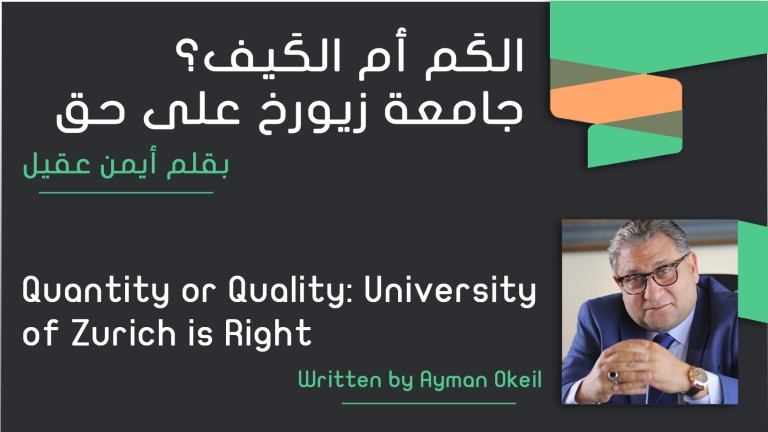By Ayman Okeil
University of Zurich made a significant decision by withdrawing from Times Higher Education World University Rankings. In a press statement, Zurich University explained that their withdrawal was a result of a thorough evaluation of ranking methodology. According to their assessment, the methodology heavily relies on quantitative criteria, which may not accurately reflect the quality of published research. Rankings tend to prioritize measurable indicators that emphasize quantity of research papers produced, rather than improvement of their content.
While this news primarily concerns an educational institution, it has broader implications for various aspects of our lives. It also has an impact on the policies of countries and governments, as prioritization of quantity over quality can influence decision-making. Therefore, this withdrawal urges us to adopt a broader perspective on issue of quality versus quantity. What is better and why? and what is the path that governments should follow to advance their people.
In education, I advocate for establishment of specialized colleges focused on technology studies and expansion of disciplines that encourage student innovation and facilitate their entry into the job market. This approach aims to bridge the gap between the number of graduates and the demand for specific skills, thereby ensuring that countries can fulfill their citizens’ right to work, as enshrined in Articles VI and VII of International Covenant on Economic, Social, and Cultural Rights.
In our daily lives, the pursuit of quantity should be accompanied by value, behavior, contribution, and impact. Avicenna (Ibn Sina), preeminent philosopher and physician of the Islamic world once said that people who lived for hundreds of years without meaningful productivity felt as though they had only lived for a single day, as their lives lacked purpose beyond basic needs. On the other hand, those who lived shorter lives but made significant contributions felt as though they had lived for thousands of years.
I anticipate that more universities will follow suit and withdraw from such rankings in the future. This marks the beginning of a shift towards prioritizing quality and nature of research over quantity. I wonder if Egyptian and Arab universities can take similar steps by directing researchers towards studying specific issues such as industrial advancement, agricultural improvement, social problems, and finding innovative solutions to drive development, rather than focusing on outdated theories. Furthermore, I encourage these universities to join Agreement on Reforming Research Assessment, overseen by Science Europe, where continuous evaluation will center on quality rather than quantity.


Add a Comment